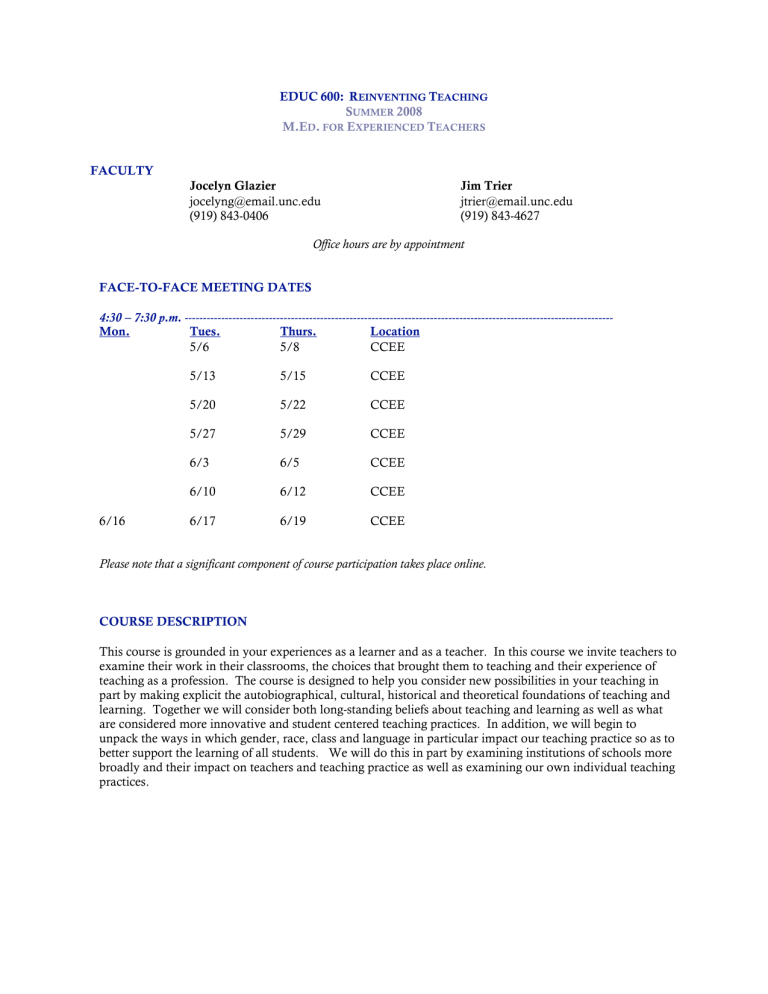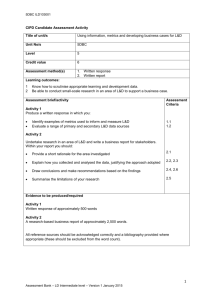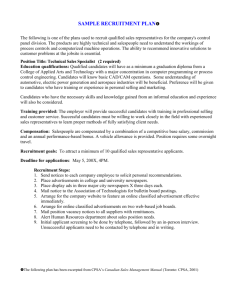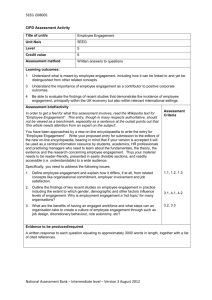Summer I 2008 Sect. 956 Glazier & Sect. 957

EDUC 600: R EINVENTING T EACHING
S
UMMER
2008
M.E
D .
FOR E XPERIENCED T EACHERS
FACULTY
Jocelyn Glazier jocelyng@email.unc.edu
(919) 843-0406
Office hours are by appointment
Jim Trier jtrier@email.unc.edu
(919) 843-4627
FACE-TO-FACE MEETING DATES
4:30 – 7:30 p.m.
---------------------------------------------------------------------------------------------------------------------
Mon. Tues.
5/6
Thurs.
5/8
Location
CCEE
5/13
5/20
5/15
5/22
CCEE
CCEE
5/27 5/29 CCEE
6/16
6/3
6/10
6/17
6/5
6/12
6/19
CCEE
CCEE
CCEE
Please note that a significant component of course participation takes place online.
COURSE DESCRIPTION
This course is grounded in your experiences as a learner and as a teacher. In this course we invite teachers to examine their work in their classrooms, the choices that brought them to teaching and their experience of teaching as a profession. The course is designed to help you consider new possibilities in your teaching in part by making explicit the autobiographical, cultural, historical and theoretical foundations of teaching and learning. Together we will consider both long-standing beliefs about teaching and learning as well as what are considered more innovative and student centered teaching practices. In addition, we will begin to unpack the ways in which gender, race, class and language in particular impact our teaching practice so as to better support the learning of all students. We will do this in part by examining institutions of schools more broadly and their impact on teachers and teaching practice as well as examining our own individual teaching practices.
Summer 2008~ page 2
GOALS AND OBJECTIVES
1.
Students will explore their educational and professional biographies in relation to each other and to the history of the profession.
2.
Students will join their own experiences of teaching to scholarly discourses that portray the history and conditions of teaching and the philosophical and sociological study of contemporary issues of teaching.
3.
Students will read and interrogate texts so as to reinvent their own teaching.
4.
Students will utilize narrative and other writing forms in course investigations as tools for reflection on teaching and learning.
5.
Students will employ various arts and media forms in inquiry and presentations that will enable close examination of certain phenomenon in schools.
QUESTIONS WE WILL BEGIN TO ADDRESS IN THIS COURSE INCLUDE:
• What is the cultural text of ‘teacher’ in the United States and how does it influence practice?
•
How and why did I become a teacher?
• What is the relationship between my story and that of other teachers?
• How do theoretical perspectives and historical experiences influence the kinds of knowledge available to and practiced by teachers?
• What is the relevance in schools of attention to issues of race/ethnicity, class, and gender?
• In what ways does my own experience as a learner impact my current practice?
•
In what ways is my pedagogy linked to student learning?
•
In what ways does my pedagogy privilege some students over others?
• What characterizes classrooms and schools in general? In North Carolina in particular?
• What are examples of progressive pedagogies that challenge the cultural text of teacher and student?
• How can teaching be reinvented within the current context?
• In what ways can I reinvent my teaching in the fall?
READINGS & MATERIALS
• The following readings will be posted in the class Blackboard space (http://blackboard.unc.edu).
Some are required, others will be optional:
Abt-Perkins, D. & Gomez, M. L. (1998). A good place to begin: Examining our personal perspectives. In M. F. Opitz (Ed.), Literacy instruction for culturally and linguistically diverse students:
A collection of articles and commentaries (pp.8-20). Newark, Delaware: International Reading
Association.
Banks, J. & Banks, C. (1995). Equity Pedagogy: An Essential Component of Multicultural
Education. Theory into Practice , Vol. 34 (3), pp. 152-158.
Breault, R. (2003). Dewey, Freire and a pedagogy for the oppressor. Multicultural Education, 10 (3), 2-
6.
DeBlois, R. (2002). John Dewey in a new century: Constructing meaning from real experience.
Independent School, 61 (4), 72-77.
Delpit, L. (1995). Other people’s children . New York: The New Press. (Chapter 2: The silenced dialogue: Power and pedagogy in educating other people’s children).
Delpit, L. (2002). No kinda sense. In L. Delpit (Ed.). The Skin That We Speak (pp. 33-48). New
York: The New Press.
Freire, P. (1970). Pedagogy of the oppressed . New York: Continuum. (Chapter 2).
Glazier, J. A. (2005). Talking and Teaching Through a Positional Lens: Recognizing what and who we privilege in our practice. Teaching Education, 16 (3), 231-43.
Gosselin, C. In a different voice and the transformative experience: A deweyian perspective.
Educational Theory, 53 (1), 91-105.
Summer 2008~ page 3
Hansen, D. (2002). Dewey’s conception of an environment for teaching and learning. Curriculum
Inquiry, 32(3), 267-280.
Henson, K. (2003). Foundations for learner-centered education: A knowledge base. Education,
124 (1), 5-16.
James, T. (2007). A Dewey school episode. In D. Hansen, M. Driscoll & R. Arcilla (Eds.). A life in classrooms: Philip W. Jackson and the practices of education (pp. 80-91). New York: Teachers College
Press.
Kumashiro, K. ‘Posts’ Perspectives on Anti-Oppressive Education in Social Studies, English,
Mathematics, and Science Classrooms. Educational Researcher, 30 (3), 3-12.
Langston, D. (2004) Tired of playing monopoly? In S. Shaw & J. Lee (Eds.). Women’s Voices,
Feminist Visions. New York: McGraw-Hill, 2004. 96-100.
Lareau, A. (1987). Social class differences in family-school relationships: The importance of cultural capital. Sociology of Education, 60 (2), 73-85.
Maher, F. (1999). Progressive education and feminist pedagogies: Issues in gender, power and authority .
Teachers College Record, 101 (1), 35-59
Ndura, E. (2004). Teachers’ Discoveries of their Cultural Realms: Untangling the Web of Cultural
Identity. Multicultural Perspectives, 6 (3), 10-16.
North, C. (2007). What do you mean by ‘anti-oppressive education’? Student interpretations of a high school leadership program. International Journal of Qualitative Studies in Education, 20 (1), pp.
73-97.
Rogoff, B. (2003). The cultural nature of human development. Oxford: Oxford University Press.
(Chapter1: Orienting concepts and ways of understanding the cultural nature of human development. Chapter 7: Thinking with the tools and institutions of culture.)
Tanner, L. (1997). Dewey’s laboratory school: Lessons for today . New York: Teachers College Press
(Chapters 3 and 8)
Weiler, K. (2004). What can we learn from progressive education? Radical Teacher, 69 , 4-9.
Zeichner, K. (1996). Teachers as reflective practitioners and the democratization of school reform.
In K. Zeichner, S. Melnick, & M. L. Gomez. (Eds.). Currents of reform in preservice teacher education (pp. 199-214). New York: Teachers College Press.
• Additional discipline-specific readings will be distributed in class.
Summer 2008~ page 4
COURSE ACTIVITIES & ASSIGNMENTS
You will be expected to play a significant role in class activities. Pedagogical strategies will include minilessons, class discussion, presentations, collaborative work, narrative-based writing, writer’s workshop and brief in-class activities. In addition, you are required to participate in Blackboard discussions, thus your participation extends beyond our face-to-face interactions.
ATTENDANCE POLICY & PARTICIPATION
Class attendance and participation are required. Because our class only meets face-to-face so few times, every absence is significant. The classes are designed to be a forum for us to engage ideas through discussions and in-class activities that supplement rather than reiterate the readings.
Ideally, you should attend all class sessions. However, I recognize that sometimes emergencies happen. If you know you will be missing a class session, contact me in advance if possible. You will be responsible for the work both due and discussed in class that day. E-mail is one convenient way of getting materials to me if you must miss class. Because this is a short semester, significant course absences will be reflected in your course grade.
EVALUATION
Professionalism (10%): You are expected to prepare for and participate in all class discussions and activities.
In addition, you are expected to be on time for all class sessions and to stay for the whole class session.
Preparation for class includes reflecting on readings before arriving in class as well as completing all assignments. Class participation includes thoughtful and respectful interaction with others during class activities and discussions.
Online Discussions and Activities (25%): This course is a seminar-style course, meaning your inclass and online contributions are a significant part of our class. The online writings and peer review activities serve as important springboards for class discussions and individual learning. You are expected to post your online postings within the specified deadlines. Responses to online prompts and your classmates’ ideas should be respectful, thoughtful and detailed. Responses to paper drafts should be both supportive and critical, with the intention to help your colleagues improve as a writer and a scholar. Your participation in small group projects is particularly critical. We have all worked in groups where we have felt as if we were doing most of the work. Do not let that be the case in this course. Self-evaluations completed after group projects will enable me to gauge each individual’s participation in the project. I expect participation in these projects to be shared equally across group members.
Teaching Narratives (45%): You will write three autobiographical narratives about what it means to be a learner and a teacher in today’s society. You will work with a writing group to help in the development of each of your narratives. The first and second narrative papers are each worth 10%, the third is worth 25% of your final grade. More information about these projects will be distributed in class and available on Blackboard.
Group Project (20%): Your “Innovative Practices” group project provides a way for you to focus on more subject specific pedagogies with colleagues who teach the same discipline you teach. More details about this assignment will follow.
High Pass (H):
Pass (P):
Low Pass (L):
Fail (F):
90-100 points
80-89 points
70-79 points
Below 70 points
Exemplary, works beyond assigned requirements
Solid, meets expectations thoroughly and well
Weak, fails to meet some assigned expectations
Unacceptable, fails to meet several expectations
ACCOMODATIONS FOR STUDENTS WITH DISABILITIES Students who require assistance or accommodations due to special needs or disabilities are expected to inform the instructor of their needs and provide the appropriate documentation from the UNC Department of Disability Services at the beginning of the course.
Summer 2008~ page 5
SCHOOL OF EDUCATION CONCEPTUAL FRAMEWORK
Preparing Leaders in Education
The School of Education is committed to the preparation of candidates who can assume leadership roles in the field of education. Such preparation is accomplished through the coherent integration of the abilities and predispositions of candidates, the knowledge and abilities of faculty, and the contextual elements of academic and field settings. Candidates accept their professional responsibilities and focus their expertise and energy on supporting Birth-12 student development and learning. They must work to maintain a meaningful involvement in activities within schools and in partnership with parents and the community.
The growth and development of candidates is promoted through curriculum, instruction, research, field experiences, clinical practice, assessments, evaluations, and interactions with faculty and peers. All of these elements work together to build a solid foundation for exemplary practice in education, creating educational practitioners who are prepared to better serve children, families and schools, as well as business and agencies of government within North Carolina, across the nation and throughout the world.
For Equity and Excellence
Preparation of educational leaders for today's society is based in values of equity and excellence that assure our candidates' and their students' future success. Attending to the challenge of promoting both equity and excellence is imperative. To address only one of these goals would, on the one hand, sacrifice those put at risk by social and cultural hierarchies in society or would, on the other hand, fail to press for the highest possible levels of accomplishment. Equity and excellence must be pursued concurrently to assure that all students are well served and that all are encouraged to perform at their highest level.
Within the School of Education, equity is seen as the state, quality, or ideal of social justice and fairness. It begins with the recognition that there is individual and cultural achievement among all social groups and that this achievement benefits all students and educators. Equity acknowledges that ignorance of the richness of diversity limits human potential. A perspective of equity also acknowledges the unequal treatment of those who have been historically discriminated against based on their ability, parents' income, race, gender, ethnicity, culture, neighborhood, sexuality, or home language, and supports the closure of gaps in academic achievement. Decisions grounded in equity must establish that a wide range of learners have access to high quality education in order to release the excellence of culture and character which can be utilized by all citizens of a democratic society.
Within the School of Education, excellence is seen as striving for optimal development, high levels of achievement and performance for all and in all that is done. In preparatory programs across grade levels, curriculum and instruction furthers excellence when it moves a learner as effectively as possible toward expertise as a thinker, problem solver and creator of knowledge. Excellence entails a commitment to fully developing candidates, not only academically but also in moral and political senses.
In a Democratic Society
The preparation of exemplary practitioners in education to meet the challenges of equity and excellence is best accomplished through preparation for a democratic society. Democracy around the globe is an ideal, one with the potential to meet the needs, recognize the interests and establish the rights of all citizens.
Education is a necessary foundation for this ideal, and both must be subscribed to and participated in by all.
School of Education Conceptual Framework Principles
The School of Education is committed to diverse, equitable, democratic learning communities. As a result, candidates are expected to acquire and apply the knowledge, skills and dispositions that prepare them to support the development and education of all students.
Summer 2008~ page 6
The School of Education uses the following unit principles, applicable at all program levels, to identify the knowledge and skills that are central to preparation of candidates. It is the School of Education’s goal that candidates will become leaders supporting and promoting the development, teaching and learning of all students in multiple contexts.
1.
Candidates possess the necessary content knowledge to support and enhance student development and learning.
2.
Candidates possess the necessary professional knowledge to support and enhance student development and learning, including meeting student needs across physical, social, psychological, and intellectual contexts. Candidates incorporate a variety of strategies, such as technology, to enhance student learning.
3.
Candidates possess the necessary knowledge and skills to conduct and interpret appropriate assessments.
4.
Candidates view and conduct themselves as professionals, providing leadership in their chosen field, including effective communication and collaboration with students and stakeholders.
SOE Conceptual Framework Dispositions
Certain dispositions are essential to prepare leaders who support equity and excellence in education within a democratic society. Dispositions are beliefs that foster commitments, leading to actions within educational environments with students, colleagues, families, and communities. Candidates strengthen these dispositions as they think deeply, reflect critically and act responsibly in their professional practice. These dispositions are interconnected with knowledge and skills; specific dispositions connect to and exemplify unit principles, facilitating their enactment in particular programs.
1.
Candidates will exhibit behavior that demonstrates a belief that all individuals can develop, learn, and make positive contributions to society.
2.
Candidates will exhibit behavior that demonstrates a belief that continuous inquiry and reflection can improve professional practice.
RELEVANT PROGRAM, PROFESSIONAL, AND STATE STANDARDS
This course is aligned with National Board for Professional Teaching Standards (NBPTS), North Carolina
Department of Public Instruction Specialty Area M.Ed. Advanced Standards (NC-T-MST), North Carolina
Department of Public Instruction Master’s Standards and UNC-Chapel Hill School of Education
Dispositions and Principles (NC-CH-D and NC-CH-P). In addition, this course is aligned with the UNC-
Chapel Hill School of Education Conceptual Framework—“Preparing Leaders in Education for Equity and
Excellence In a Democratic Society.” Some of these standards are addressed but not directly assessed in the course, as noted. Specifically, we will address the following standards in this course:
NBPTS-1:
NBPTS–4:
Teachers are committed to their students and their learning. (not assessed)
Teachers think systematically about their practice and learn from experience.
NBPTS–5: Teachers are members of learning communities.
NC-CH-D1: Candidates will exhibit behavior that demonstrates a belief that all individuals can develop, learn, and make positive contributions to society. (not assessed)
NC-CH-D2: Candidates will exhibit behavior that demonstrates a belief that continuous inquiry and reflection can improve professional practice.
NC-CH-P4: Candidates view and conduct themselves as professionals, providing leadership in their chosen field, including effective communication and collaboration with students and stakeholders.
NC-T-MST-2006.5: Professional Development & Leadership. The candidate engages in continued professional development and provides leadership at the classroom, school, and community levels, and within the profession.
Special Education Standard 8: Teachers use knowledge about cultural, socio-economic and family dynamics to guide instructional and/or management planning and selection of teaching techniques (not assessed)








